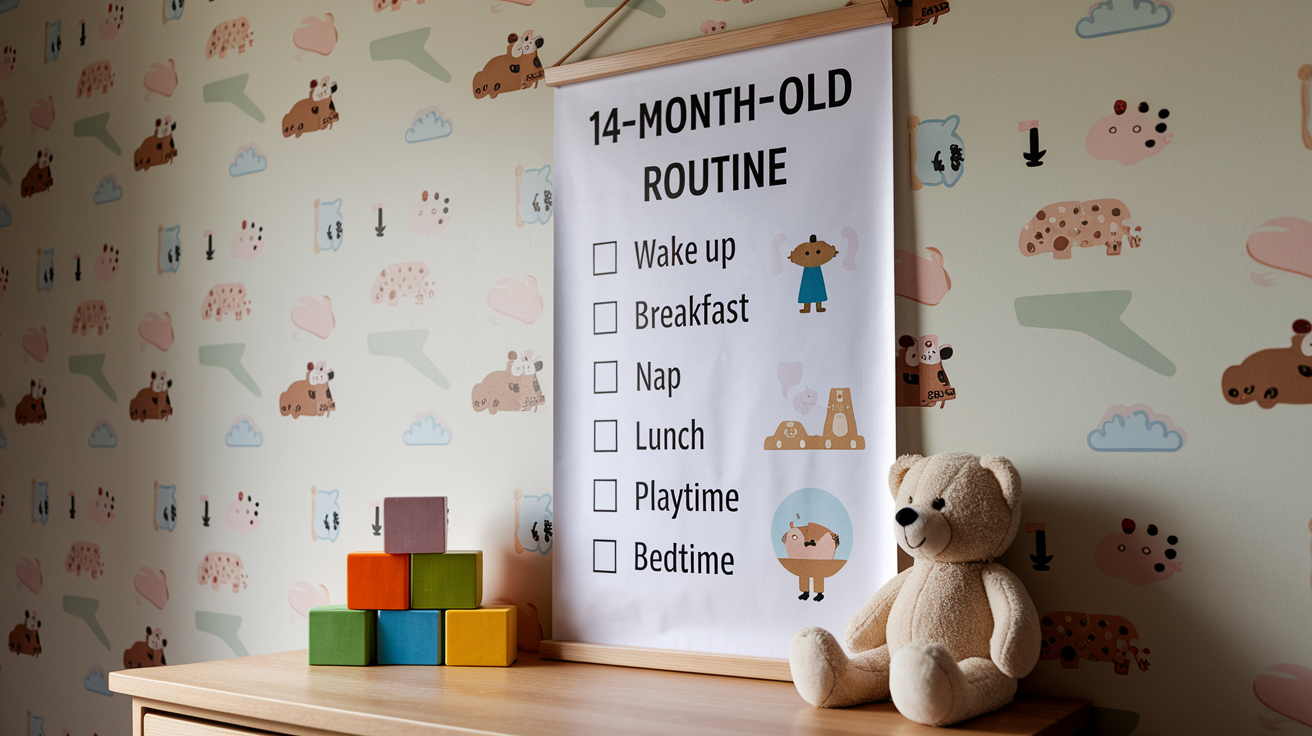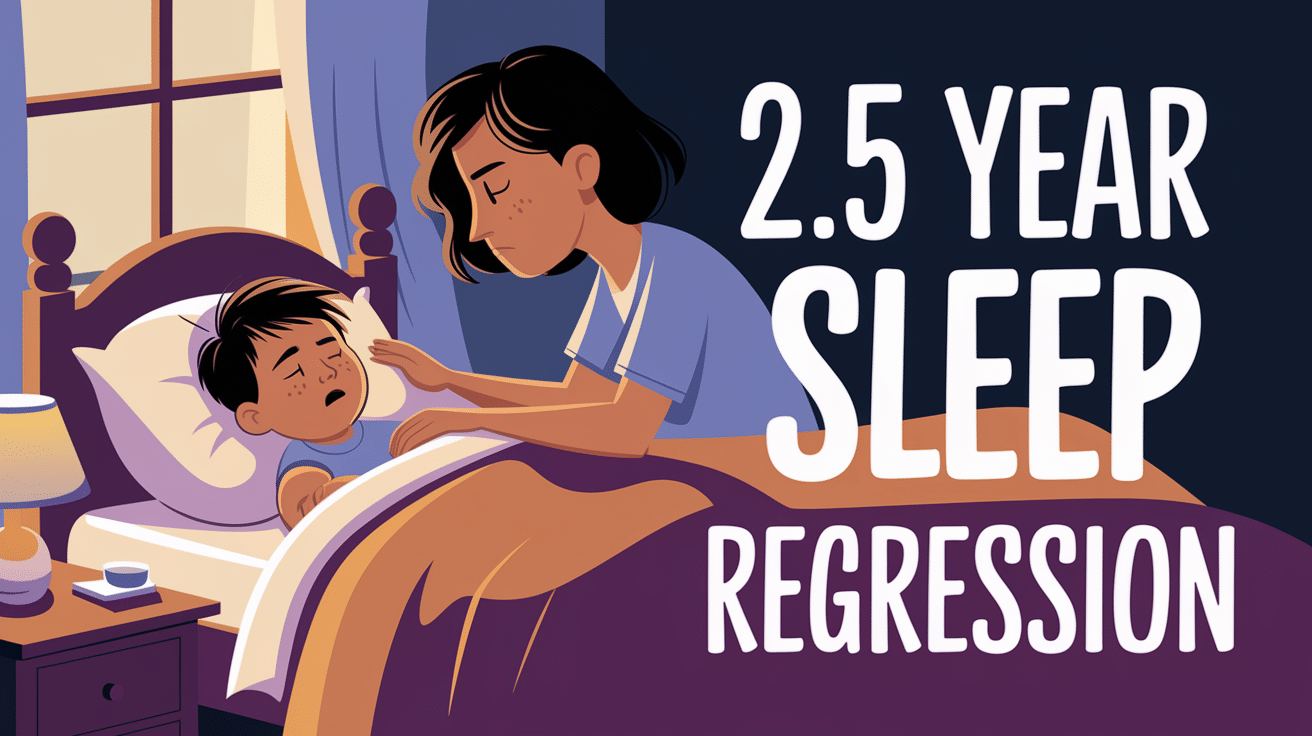
You hear crying from your baby’s room—again. Just when you thought your little one was sleeping through the night, those wake-ups are back. We know how tired you must feel.
If your 14-month-old who used to sleep well now wakes up at night, you’re not alone. Many parents go through this tough time just when they think sleep problems are over.
Why does this happen? Your toddler might be learning to walk, getting new teeth, or just wanting to be with you. The good news is that this sleep trouble won’t last forever.
Small changes can help your child sleep better. This guide offers easy tips that real parents use. You don’t need special tools or hard plans—just simple steps you can try tonight that might help everyone get more sleep.
Why Does My 14-Month-Old Keep Waking Up at Night?
Night-waking at 14 months is very common. Many babies who slept well before start waking up again at this age. Your little one isn’t doing this to upset you. There are many normal reasons for these sleep changes.
Most parents go through this tough time. You are not doing anything wrong if your toddler wakes up at night. Even the best sleepers have times when sleep gets worse.
These sleep troubles are almost always temporary. Most children return to better sleep patterns within a few weeks.
The next section will explain the main causes of night-waking. Knowing why your baby wakes up can help you find the right way to respond.
For a deeper look at this topic, check out our detailed guide on Why Babies Wake up At Night.
Causes of A 14-Month-Old Waking up At Night?

Sleep disruptions at 14 months are a common hurdle many parents face. Your toddler might suddenly start waking up at night despite having slept well for months. This shift can happen for several reasons:
- Teething pain often disrupts sleep at this age. Molars are bigger than front teeth and can cause more discomfort. Your baby might rub their face, drool more, or be fussier than usual when teeth are coming in.
- Separation anxiety typically peaks around 14 months. Your baby now understands you exist even when they can’t see you. Waking up alone can trigger tears as they want to make sure you’re still nearby.
- Growth spurts happen regularly in the second year. These physical changes can make babies hungrier at night and cause body discomfort that wakes them from sleep.
- Hunger can wake toddlers who are very active during the day. Some children need a small bedtime snack to keep their tummies full through the night.
- Developmental milestones like walking or talking excite your baby’s brain. This mental stimulation can make it harder to stay asleep as they practice these skills even during rest time.
- Sleep regression is common at this age. Your once-good sleeper may suddenly wake more often. This temporary phase usually passes within a few weeks.
Remember that these sleep disruptions are temporary and completely normal. Nearly all children go through phases of night-waking.
Tips for Helping Your 14-Month-Old Sleep Better at Night

Now that we understand why your 14-month-old might be waking up at night, let’s focus on solutions.
You might not see results right away, but gentle consistency often leads to better nights for everyone. Try these strategies and adapt them to fit your child’s unique needs and personality.
Establish a consistent bedtime routine:
A warm bath, quiet story, and soft lullaby in the same order each night help your baby know what to expect. Keep the routine short—about 30 minutes works well for most toddlers.
Create a comfortable sleep environment:
Keep the room slightly cool (between 68-72°F). Use blackout curtains to block outside light. A white noise machine can mask household sounds that might wake your little one. Make sure the crib mattress is comfortable and the sheets are clean.
Limit stimulating activities before bed:
Avoid screens (TV, tablets, phones) for at least an hour before sleep time. Replace active play with quiet activities like looking at books or simple puzzles. Dim the lights throughout the house as bedtime approaches.
Be consistent with your sleep approach:
Changing methods confuses your child and makes progress harder. Pick a sleep training method that fits your family and stick with it for at least two weeks before deciding if it works. Both parents should use the same approach.
Sample Schedules for a 14-Month-Old’s Sleep Routine

A predictable daily schedule helps your 14-month-old’s body develop a natural rhythm, making sleep come more easily. Most toddlers this age need about 11-14 hours of total sleep per day, including naps.
While every child is different, these sample schedules can give you a starting point to create a routine that works for your family.
The first table shows a schedule for toddlers who take two shorter naps, while the second shows a pattern for those who have transitioned to one longer midday nap.
Notice how the timing of the last nap, dinner, and bedtime routine helps set the stage for better nighttime sleep.
Two-Nap Schedule
| Time | Activity |
|---|---|
| 6:30-7:00 AM | Wake up & morning cuddles |
| 7:15 AM | Breakfast |
| 9:00-9:30 AM | Morning snack |
| 9:45-11:00 AM | First nap (1-1.25 hours) |
| 11:30 AM | Lunch |
| 1:00 PM | Afternoon snack |
| 2:00-3:00 PM | Second nap (1 hour) |
| 5:00 PM | Dinner |
| 6:30 PM | Start bedtime routine (bath, books, etc.) |
| 7:00-7:30 PM | Bedtime |
One-Nap Schedule
| Time | Activity |
|---|---|
| 6:30-7:00 AM | Wake up & morning cuddles |
| 7:15 AM | Breakfast |
| 9:30 AM | Morning snack |
| 10:00-11:00 AM | Active playtime |
| 11:30 AM | Lunch |
| 12:00-2:00 PM | Nap (1.5-2.5 hours) |
| 2:30 PM | Afternoon snack |
| 4:00 PM | Quiet play activity |
| 5:15 PM | Dinner |
| 6:30 PM | Start bedtime routine |
| 7:15-7:45 PM | Bedtime |
Need help with other ages? Check our other guides on baby sleep schedules, including:
- 8-month-old sleep schedule
- 12-month-old sleep schedule
- 16-month-old sleep schedule
- 2.5-year-old sleep schedule
Common Mistakes Parents Make When Dealing with Night Wakings!

When trying to solve sleep problems with your 14-month-old, watch out for these common pitfalls:
- Responding too quickly to every small noise without giving them a chance to self-settle
- Inconsistent bedtime routine – varying the time or steps each night
- Offering food during night wakings when hunger isn’t the real issue
- Creating dependency on rocking, holding, or patting to fall asleep
- Skipping daytime naps in hopes of better nighttime sleep
- Missing possible health issues that could be causing discomfort
- Allowing too much excitement or screen time in the hour before bed
- Giving up too quickly on a sleep training method before it has time to work
- Bringing your toddler into your bed inconsistently, creating confusion about where sleep happens
- Keeping the room too warm or too bright for optimal sleep
Understanding these common mistakes can help you avoid them and create a more effective sleep plan for your little one.
You’ve Got This!
Your 14-month-old’s sleep troubles won’t last forever. This phase is a normal part of your child’s growth and development. The key to getting through it is patience and consistency.
Remember that small changes can make a big difference. Start with a solid bedtime routine and a sleep-friendly room.
Be gentle but firm in your approach. What works for one family might not work for yours, so feel free to adjust these tips to fit your child’s needs.
Trust your instincts—you know your little one best. If sleep problems continue for more than a few weeks or seem linked to health issues, talk with your doctor.
Most toddlers return to better sleep patterns with time and the right support from loving parents like you.



























































